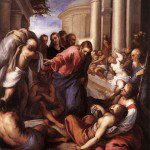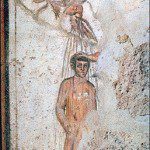Christ came to bring life, new life, to the people of the world. Before his advent, they were stuck in the decay of sin, the decay which leads to death and the abyss which followed afterwards. The law of death ruled over creation. We can see its effects all around us: everything falls apart, everything perishes. To be born into the world is to be born unto death. Life competes with death, and death prevails; even survival in the world requires nourishment which is given to us by death. The contamination of sin is universal; how it came about, who first sinned and why, is a matter of theological speculation and debate. Such questions, while important in other situations and contexts, need not concern us here. Just as a person who finds themselves poisoned will first seek an antidote to the poison, if it exists, we find ourselves given into a world where the net of sin is all around us, death is before us, and we, desiring to get out of that net, must find the path to salvation. We could, if we want, investigate how such sin came into the world, how it entrapped us in its clutches, but what we really want is the way out of that trap, and the more we investigate its history, the more it can cover us and make it that much more difficult for us to give out of its domination over our lives.
![Jesus and Nicodemus by Henry Ossawa Tanner [Public domain], via Wikimedia Commons](https://wp-media.patheos.com/blogs/sites/637/2017/05/Henry_Ossawa_Tanner_-_Jesus_and_nicodemus-300x257.jpg)
Jesus answered, “Truly, truly, I say to you, unless one is born of water and the Spirit, he cannot enter the kingdom of God. That which is born of the flesh is flesh, and that which is born of the Spirit is spirit. Do not marvel that I said to you, `You must be born anew’” (Jn. 3:5-7 RSV).
The answer Jesus gave is fairly well known: we must be born anew. That is, we must be born again, born in a way which is no longer connected merely to the transient, decaying world of sin. We must be born through the power of the Spirit, the Holy Spirit, the Lord and giver of life, who is sent from the Father, through the Son, and unto us. We must be born anew, touching eternity, touching eternal life, while remaining true to ourselves, true to our nature as bodily beings, beings in the flesh, so that by grasping after and partaking of the bountiful potential of being found in eternity, the flesh itself can find itself born into the kingdom of God as well. It must not be flesh alone, flesh disconnected from the grace of eternity, but it cannot be disconnected from its nature, from its connection to the material world.
What is required is something new and fresh which can be given to our whole being, including the flesh. It is an addition given to us by the Spirit. It comes to us in the temporal world, in the world of our ordinary experience, in the world which we first find ourselves experiencing, and it slowly integrates us into the higher, bountiful world of the kingdom of God which is all around our existence but hidden from us thanks to sin. As we find it penetrating us, integrating itself in our being, we continue to exist in the temporal realm, in the world of death, and so we find ourselves affected by that world by being in that world, but we are no longer contained by it but rather we find ourselves in it and transcending it in the world beyond sin, in the kingdom of heaven which surrounds it, with the net being taken off us so that we can find ourselves free persons in the kingdom of God.
We must allow our temporal form to live out its proper days, reaching the end of its way of life, but as we see it die in the world and with the world, we also reach out to the transcendent Spirit, open ourselves to the kingdom of God, and so as our temporal being dies, we find our state of being transformed into that of eternal life. If we have been born again and let that birth take root in our being, at the end of our temporal existence we can find the fullness of our being transformed by the life-giving Spirit and spiritualized, made eternal and deathless. In eternity, what we did in life, the marks of our temporal experience of life, will come with us: they are not lost, for they are a part of who and what we are, not just in time, but in eternity as well.
Thus, we are told by Jesus, we must be transformed and born anew in that transformation, seeing our temporal life as the foundation for that new birth, that eternal birth of the Spirit. We will find that our new, spiritual life is conceived in womb of the temporal world, and that womb is opened and lets us out in our death, so what is made of in time is established in eternity, with death as the gateway between the two modes of existence. Through death, our spiritual birth is complete. The process of that birth begins in the transient world of temporal creation, but ends in eternal life, so that our existence here is true, and is important in our development, just as what happens in the womb is true and important in the development of the fetus before it is born into the world.
Thus, just as we are born in the world, born into time, born with the taint of sin and decay leading us to our death, so we must be born again, born again through the grace of the Spirit, if we want to enter into the kingdom of God and its eternal life away from death. Without the Spirit, without the grace of the Spirit, eternity will be an eternal death, a life in death, a perpetuation of the living death which we encounter in the temporal world so that it becomes a living of the realm of death without end; it is life, life everlasting, but without the Spirit of life, and so it is the second death. The first death is the end of our life in the temporal world, the second death is eternal life separated from the Spirit of life, life apart from that which energizes life and renders it a beautiful joy to possess.
The process by which we find ourselves integrated with the bounty of the kingdom of God, this grace of the Spirit, is traditionally indicated with one name for it: baptism. By our baptism, we find ourselves connected to Christ, so that we share in and participate in his death and therefore in his resurrection. “For as many of you as were baptized into Christ have put on Christ” (Gal. 3:27 RSV). We die with him and in him by the grace of the Spirit which makes us one with him. We are given new life. We share in his death, so that as death is overcome by his death, we find ourselves experiencing the end of death; then, through the life-giving Spirit, the Spirit of Christ, the Holy Spirit, we receive the unlimited healing bounty of life which helps us to rise up with Christ, to rise up with new life, life from the Spirit of life.
We are baptized into Christ. We put on Christ. We put on his death and his resurrection. Through the grace of the Holy Spirit, we are able to be tied to Christ, to walk with new life, to be born again. “Do you not know that all of us who have been baptized into Christ Jesus were baptized into his death? We were buried therefore with him by baptism into death, so that as Christ was raised from the dead by the glory of the Father, we too might walk in newness of life” (Rom. 6:3-4 RSV). As the Spirit of Christs penetrates through the world of sin to join with us, we become, as it were, spiritual embryos awaiting our eternal birth in the kingdom of God. It is in us now, even as we continue in the temporal world. We are expected to grow in the Spirit of Life, to render to it all that is touched by the sting of death so that it can be taken over by life; we must not resist the Spirit but let work in us, transforming us to truly unite our whole being with Christ so that we find ourselves following Christ, not just in the new birth, but in his ascent into heaven and find ourselves fully rendered whole in the kingdom of God.
Stay in touch! Like A Little Bit of Nothing on Facebook:
A Little Bit of Nothing
















